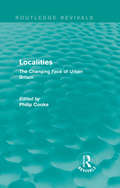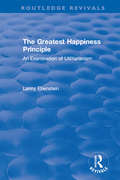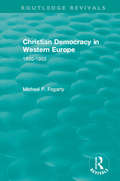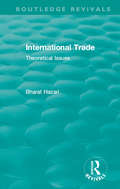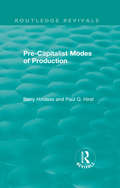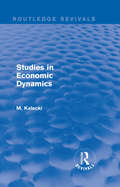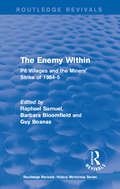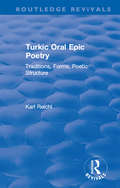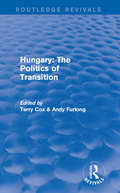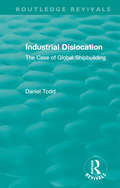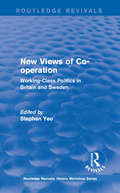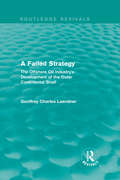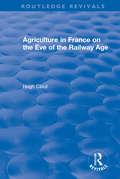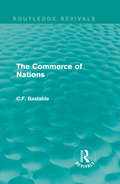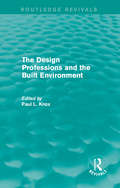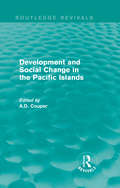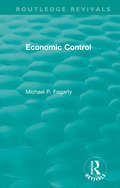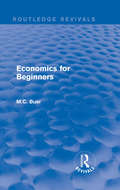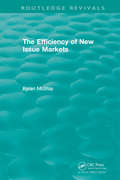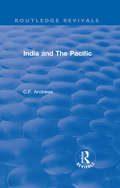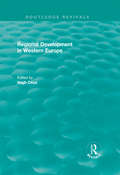- Table View
- List View
Routledge Revivals: The Changing Face of Urban Britain (Routledge Library Editions: Social Theory Ser.)
by Philip CookeFirst published in 1989, this book examines seven different localities, ranging from the outer suburbs of large northern cities to small freestanding town, which were prospering in the 1980s or struggling against the negative employment effects of restructuring. Within the theoretical frame of ‘industrial restructuring’, it traces the development of each locality, exploring in depth the influence of several key elements — deindustrialisation, technological change, the shift to the services in employment — on social composition, political change and local policy. A major contribution to locality studies, this book is essential reading for students of urban and regional studies, and sociology.
Routledge Revivals: An Examination of Utilitarianism (Routledge Revivals)
by Lanny O. EbensteinFirst published in 1991, The Greatest Happiness Principle traces the history of the theory of utility, starting with the Bible, and running through Plato, Aristotle, and Epicurus. It goes on to discuss the utilitarian theories of Jeremy Bentham and John Stuart Mill in detail, commenting on the latter’s view of the Christianity of his day and his optimal socialist society. The book argues that the key theory of utility is fundamentally concerned with happiness, stating that happiness has largely been left out of discussions of utility. It also goes on to argue that utility can be used as a moral theory, ultimately posing the question, what is happiness?
Routledge Revivals: 1820-1953 (Routledge Revivals)
by Michael P. FogartyFirst published in 1957, this book is a detailed analysis on Christian Democracy, a movement backed by Protestants as well as Catholics, which has become one of the great social forces of Western Europe. It is strong in eight countries. The first half of Fogarty’s book sets out what the many Christian-Democratic movements stand for. The second part of the book shows how these movements began, how they have grown, changed, and consolidated, and how they developed into the mid-20th century. This is a broad and useful survey which delves the history, nature and significance of the Christian Democratic movements in Europe. In Fogarty’s analysis, Christian Democracy may indeed bring about a renewed unity of the Christian tradition in Western society.
Routledge Revivals: Constructing the Future (Routledge Revivals #28)
by Kevin HarrisOriginally published in 1994, Teachers: Constructing a Future is designed for teachers, as well as those interested in the future of schooling and education. The book draws on sociological analysis, philosophical insights and aspects of political economy to examine the changing and developing role of teachers in the context of the current transformation of western capitalism. It considers the historical growth of teaching as a profession and as a political force, and indicates that economic rationalism has been effectively employed to elevate the instrumental role of schooling in society, and consequentially to devalue the professional and political nature of teaching.
Routledge Revivals: Theoretical Issues (Routledge Revivals)
by Bharat HazariFirst published in 1986, this book examines international trade, offering different theories and considering contemporary developments. Professor Hazari connects these theories and developments, such as theories of comparative advantage and factor-price differentials, to economic expansion and terms of international trade. Many key economic problems are related to the theory of international trade, problems such as tariffs, the dependency of developing countries and changing patterns of world trade, and the book shows how theory impinges on these other important issues. The theory of international trade is a popular and widely taught specialism within economics. This book surveys the pure theory which forms the core of the topic.
Routledge Revivals: An Auto-critique Of Pre-capitalist Modes Of Production (Routledge Revivals)
by Paul Q. Hirst Barry HindessFirst published in 1975, this book investigates the various pre-capitalist modes of production briefly indicated in the works of Marx and Engels, and gives an examination of the conditions of the transition from one mode of production to another. The fundamental concepts used in these investigations, including those of mode of production, of necessary labour and surpass labour, of politics and state, are derived from Capital and from other works of Marxist theory. The primary aim of the analysis is to raise the conceptualisation of pre-capitalist modes of production and of transition to a more rigorous level. This book will appear controversial to both Marxists and non-Marxists alike.
Routledge Revivals: Studies In Economic Dynamics (1943) (Routledge Revivals)
by M. KaleckiFirst published in 1943, this work contains five interconnected essays presenting the author's renowned additions to the business cycle theory. Written by one of the most distinguished economists of the 20th century, this work will be essential reading for students and scholars of the history of economic thought, monetary theory and macroeconomics.
Routledge Revivals: Pit Villages and the Miners' Strike of 1984-5 (Routledge Revivals: History Workshop Series)
by Raphael Samuel, Barbara Bloomfield & Guy BoanasFirst published in 1986, this book challenges the notion that the miners’ strike of 1984-5 was ‘Scargill’s Strike’. It shows some of the ways in which the strike, though nominally directed from above, was determined from below by multitudinous and often contradictory pressures — the lodge, the village and the home. The focus is essentially logical and gives particular attention to family economy, kin networks and intergenerational solidarity. At the same time it is concerned with the mentality of the strike — its ruling fears and passions. The first-hand testimonies that comprise the book attest to the attachment to ‘traditional ways’ as well as the potency of the influences corroding them.
Routledge Revivals: Traditions, Forms, Poetic Structure (Routledge Revivals)
by Karl ReichlOriginally published in 1992, Turkic Oral Poetry provides an expert introduction to the oral epic traditions of the Turkic peoples of central Asia. The book seeks to remedy the problem of non-specialists’ lack of access to information on the Turkic traditions, and in the process, it provides scholars in various disciplines with material for comparative investigation. The book focuses on "central traditions" of this region, specifically those of the Uzbeks, Kazakhs, Karakalpak’s, and Kirghiz and looks at the historical and linguistic background to a survey of the earliest documents, portraits of the singers and of performance considerations of genre, story-patterns, and formulaic diction, and discussions of "composition in performance", memory, rhetoric and diffusion.
Routledge Revivals: The Politics Of Transition (Postcommunist States And Nations Ser.)
by Terry Cox & Andy FurlongFirst published in 1995, the aim of this book is to review various aspects of the process of democratic transition in Hungary over the period of its first post-communist, freely elected parliament between 1990 and 1994. The studies collected in this book attempt to put them in the context of longer-term trends in Hungarian politics. Hungary offers an example of the problems of political change common to Eastern Europe following the collapse of the Eastern Bloc but also demonstrates a relatively stable and successful transformation built on a unique experience under communist rule that helped prepare it for a market-orientated economy transition and political pluralism.
Routledge Revivals: The Case of Global Shipbuilding (Routledge Revivals)
by Daniel ToddFirst published in 1991, this book offers a thorough examination of the decline of heavy industry in industrialised countries in the West, which focuses on problems in the shipbuilding industry. Todd argues that three points are central to its demise: industrial life cycles, the international division of labour and the energy crises of 1973. His work begins with despondency in western shipbuilding, going back as early as 1956, when Japan usurped Britain as the pre-eminent ship producer. The book goes on to explore international trade and industry in the second half of the 20th century, with analysis on industrial reorganisation and East Asian conglomerates, diversification with the marine industries, and shipbuilding in Brazil, India, and China.
Routledge Revivals: A Global Perspective (Routledge Revivals)
by Daniel ToddOriginally published in 1989 Defence Industries presents a worldwide survey of defence industries. It argues that modern weapon systems and electronic warfare have led to the transition of the military-industrial enterprise into a multifaceted entity where electronics production is the key. It analyses the extent of defence industries, showing that large portions of the aerospace, shipbuilding, motor vehicle and electronics industries are devoted to defence and discusses where the defence industries are located. It examines the differences in government policies, contrasting the superpowers, with newly industrialised countries.
Routledge Revivals: Working-Class Politics in Britain and Sweden (Routledge Revivals: History Workshop Series #9)
by Stephen YeoFirst published in 1988, this book sets out to reinterpret the changing place of working-class association in capitalist Britain. It argues that in combination, co-operation and association constitutes labour’s power — what is has to work with and who to work for — yet social historians have tended to overlook such views in a co-operative setting. What was the struggle, what form did it take, who were the protagonists and what relevance did they have to the community co-operators of the 1980s? The essays collected in this book explore class potential and class conflict within and against co-operative thought and practice.
Routledge Revivals (1919): With an Examination of the Proposed "Capital Levy"
by J.E. AllenFirst published in 1919, this book traces the growth of War Debt during the First World War, examines the real meaning of the Debt and discusses the proposals for clearing it. As the chief contemporary proposal put forward for meeting the interest and repaying the principal of the Debt was the "Conscription of Wealth", or the "Capital Levy", this provides a main focus for the analysis. The author also examines whether the methods of financing war — by borrowing the required money — is sound and whether it should be replaced by taxation. A plan for the reform of income tax is put forward, designed to yield two-thirds of the revenue needed for a Peace Budget that also addresses the War Debt.
Routledge Revivals (1993): The Offshore Oil Industry's Development of the Outer Contintental Shelf
by Geoffrey C. LaendnerFirst published in 1993, this book traces and analyses the changing policies of American offshore oil companies concerning the exploration and development of the Outer Continental Shelf in the period from 1970 to 1976 — covering environmental legislation, the oil embargo, presidential initiatives, and proposed international laws. Where previous studies concerning the Outer Continental Shelf had only examined broad policy issues on an international level, this study focuses on those American offshore companies who were major actors in ocean affairs, especially in the exploration and development of the region.
Routledge Revivals: Agriculture in France on the Eve of the Railway Age (Routledge Revivals)
by Hugh CloutFirst published in 1980, this compact and useful book uses the earliest volumes of government-published statistics, and with the aid of computer-generated cartography, transforms the numbers there reported into an arrondissement-by-arrondissement comparative picture of French agriculture in the mid-1830s. Clout reviews problems of rapid population growth, scarcely adequate domestic food supplies and primitive systems of transportation, while attention is drawn to spatial variations in agricultural activity and productivity. Commercial, high-yielding farming was best developed in a northern multi-nuclear region, comprising of Ile-de-France, Normandy and Nord, with smaller foci of commercial orientation along an eastern axis from Alsace to Marseilles and in western areas from the Loire to the middle of the Garonne valley. Clout concludes that the revolutionary promise of national economic unity was far from being realised in the 1830s and was not to be achieved until national systems of transport and education were firmly established later in the nineteenth century.
Routledge Revivals: The Commerce of Nations (1923)
by C.F. BastableFirst published in 1929, this book was written to express the belief that nations’ commercial policy and doctrines could best be explained by reference to their history. The author argues that this applies equally to legislation and theory, for example both the McKinley Act of 1890 and contemporaneous protectionism are examined as the culmination of a century’s worth of legislative and theoretical progress. This edition is also updated from the original 1891 publication to take account of the effect of the First World War on the European and American tariff systems, and also how the preferential system of trade within the British Empire recast relations between Britain and its dominions.
Routledge Revivals: The Design Professions and the Built Environment (Routledge Revivals)
by Paul L. KnoxFirst published in 1988, this book argues that discussions of urban development often neglect to consider that much of the urban environment is designed by architects and planners, and that the particular world-view of architects and planners is crucial for the way proposals are taken up, modified and carried out. The author explores the world-view of architects and planners, considering their approach to design and the factors which influence this — work patterns, career paths and the firms in which they operate. The author also studies their place in the political decision-making process as it affects urban questions and then explores how architects and planners roles are changing.
Routledge Revivals: Development and Social Change in the Pacific Islands (1989)
by A. D. CouperFirst published in 1989. The Pacific Islands are amongst the poorest countries of the developing world. The special problems of their small size, immense distance from major centres and, for many, very poor agricultural possibilities make development extremely difficult. However, recent new advances in maritime technology in a wide range of different areas present substantial new opportunities. This book surveys the new developments — including extended maritime boundaries; giant clam farming; increased exploitation of ocean minerals and new fisheries techniques — and demonstrates the potential for far-reaching economic and social development.
Routledge Revivals: Economic Control (Routledge Revivals)
by Michael P. FogartyFirst published in 1955, this book offers a detailed history from the past to the mid-20th century on economic control. The book examines economic competition, particularly regarding the British economic system, and Fogarty looks at its scope, as well as its limits. This analysis considers working conditions in the mid-20th century, examining the impacts of industry on the life and work of the British agricultural population. The book first examines production decisions, arguing that a systematic and periodic overhaul of control mechanisms are required. Fogarty goes to give a detailed analysis on decisions about industry objectives. Ultimately, a broader look is given on the wider economic setting, and the definition of the economist is itself examined, taking into account the wider role that economics played in 20th century society.
Routledge Revivals: Economics for Beginners (1921)
by M.C. BuerFirst published in 1921, this book is intended to provide a comprehensive overview of economics to beginners, with only the more intricate and controversial subjects — such as economic rent — being omitted for the sake of clarity. The subject is dealt with as concretely as possible with extensive descriptions and examples provided to further elucidate the subject while avoiding unnecessary technicalities. The arrangement of the material is based on the author’s experience of teaching economics and postpones the more difficult elements to the end of the book in order to provide a more thorough grounding in the essentials before introducing them to the reader.
Routledge Revivals: The Efficiency of New Issue Markets (Routledge Revivals)
by Kyran McStayFirst published in 1992, The Efficiency of New Issue Markets provides a theoretical discussion of the adverse selection model of the new issue market. It addresses the hypothesis that the method of distribution of new issues has an important bearing on the efficiency of these markets. In doing this, the book tests the efficiency of the Offer for Sale new issue market, which demonstrates the validity of the adverse selection model and contradicts the monopsony power hypothesis. This examines the relative efficiency of the new issue markets and in turn demonstrates the importance of distribution in determining relative efficiency. The book provides a comprehensive overview of under-pricing and through this assesses the efficiency of new issue markets.
Routledge Revivals: India and The Pacific (Routledge Revivals)
by C.F. AndrewsFirst published in 1937, this book examines the changes in working conditions and vast improvements on sugar plantations in 20th century Fiji. By the 1930s, the sugar industry had become economically stronger through the substitution of the small tenant farm for the large plantation. Andrews examines how this led to a moral and social transformation in Fijian society. He also highlights many unsolved problems, and is aware that dependence on a single crop supported by imperial preference is too narrow a basis for progress in Fijian society. In the latter chapters Andrews reviews the position of Indian dispersion in the pacific, and reviews the relation of India itself to the pacific countries and Europe at a time when the British Empire was experiencing a great fall in prestige. There are also chapters that contain matters of specific interest to Australia, New Zealand, and Canada.
Routledge Revivals: Reactions to the Right (Routledge Revivals)
by Barry HindessFirst published in 1990, this book was intended as a counter to the rising and continued strength of the New Right and an attempt to bolster the perceived weakness of the opposition — providing a critical discussion of New Right ideology and also of the more influential Left reactions to them. The contributors scrutinise the attempts to reconstruct the idea of socialism in the 1990s, and pinpoint the relation of socialism to freedom, equality and the market. In the course of this searching evaluation, they also take up issues relating more directly to specific policy areas such as monetary policy and international finance, secondary education, social welfare, and race relations.
Routledge Revivals: Regional Development in Western Europe (1975)
by Hugh CloutFirst published in 1975, this book provides a straightforward examination of regional differences and regional development in the countries of Western Europe. Professor Clout divides this into two parts. The first examines a series of themes with reference to the whole of Western Europe, and the second part discusses regional development in individual countries or groups of countries. Contributions by experts from the UK and from mainland Europe present an essentially geographic approach, combining thematic and country-by-country discussions.
